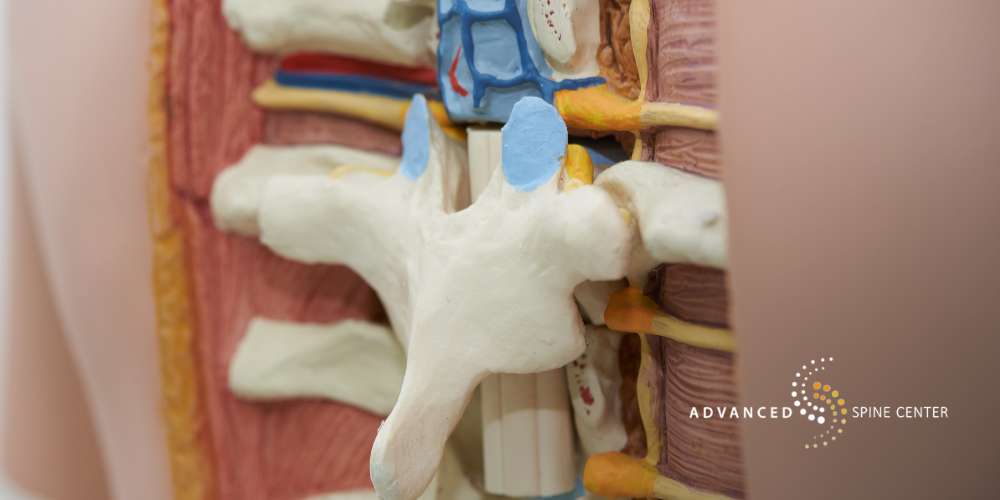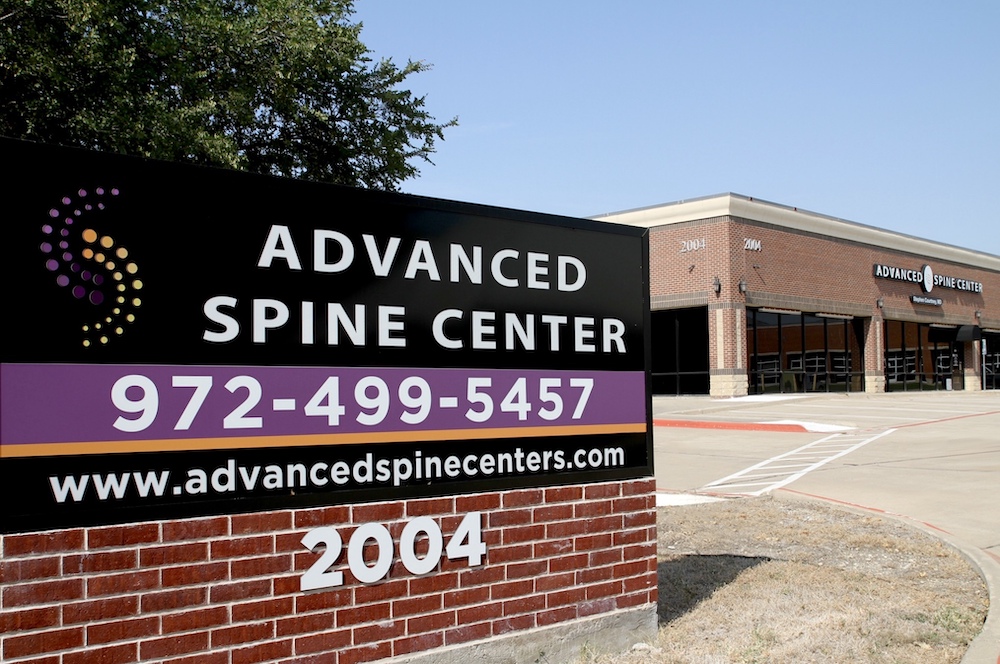Specialties
Table of Contents
Thoracic Spine Pain Treatment in Plano

Thoracic spine pain, or pain in the upper middle section of the spine, can significantly impact your quality of life, affecting your ability to work, enjoy recreational activities, and even perform daily tasks. Luckily, a thoracic medial branch block injection can help relieve some of this pain and let you get back to living your life on your own terms.
At Advanced Spine Center in Plano, TX, board-certified orthopedic spine surgeon Stephen Courtney, MD specializes in providing comprehensive care for individuals suffering from thoracic spine pain. Whether you’re experiencing discomfort due to injury, degenerative conditions, or other underlying issues, Dr. Courtney is here to help you find significant pain relief.
Take your first step toward recovery–contact the thoracic spine specialists at Advanced Spine Center today by calling (972) 499-5457.
What Are the Thoracic Vertebrae?
The thoracic vertebrae are the bones that make up the midsection of the spine. There are twelve thoracic vertebrae in total. These vertebrae serve as attachment points for the ribs and play a crucial role in supporting the upper body and protecting the spinal cord.
Thoracic Spine Anatomy
In between the 12 thoracic vertebrae are different joints, known as facet joints, and medial branch nerves, which are located near these joints.

Thoracic Facet Joints
The thoracic facet joints are located at the back of the spine between adjacent thoracic vertebrae. Each facet joint consists of two opposing surfaces covered in cartilage, allowing the vertebrae to move smoothly and in a controlled manner. It’s important that these facet joints both guide and limit the range of motion in the thoracic spine so that the spine cannot excessively twist and spin, causing injury.
Thoracic Medial Branch Nerves
The thoracic medial branch nerves are very small nerve branches that send pain signals from the thoracic spine facet joints to the brain. When a facet joint is inflamed or injured, these nerves send signals to the brain which indicate that these joints are experiencing pain. This could be the result of facet joint syndrome or another spinal condition affecting the facet joints.
What Is a Thoracic Medial Branch Block?
A thoracic medial branch block is a minimally invasive procedure used to diagnose and treat pain originating from the facet joints in the thoracic spine. During the procedure, a local anesthetic is injected near the thoracic medial branch nerves that transmit pain signals from the facet joints to the brain.
Thoracic medial branch blocks are primarily used for diagnostic purposes. By temporarily preventing these nerves from transmitting pain signals to the brain, physicians can determine if the patient’s facet joints are the source of their pain, or if their pain is from another part of their spine.
If the patient’s pain lessens or disappears after the injection, then physicians can implement other, less temporary interventions for managing chronic thoracic pain. These injections can also be used in different parts of the back, depending on where the patient is experiencing pain. At Advanced Spine Center, we can provide patients with:
- Cervical medial branch block injections
- Thoracic medial branch block injections
- Lumbar medial branch block injections
What Happens During a Thoracic Medial Branch Block Injection?
During a thoracic medial branch block injection, the patient is given a local anesthetic which is injected into their back near the thoracic medial branch nerves in their spine. When receiving the injection, the patient typically lies on their stomach.
The area where the injection will be is cleaned, and a small needle may be used to inject a local anesthetic to the area of the back. This is to prevent discomfort from the larger spinal needle used to administer the nerve block anesthetic.
Then, doctors will use a fluoroscopic x-ray to ensure that the injection is administered in the correct place. A needle is inserted near the thoracic medial branch nerves where the pain is coming from.
Once the needle is in position, a local anesthetic, which is sometimes mixed with a corticosteroid, is injected, temporarily blocking the medial branch nerves from sending pain signals to the brain. If the patient’s pain is the result of their thoracic facet joints, then the injection will immediately alleviate some or all of that pain.
The entire procedure usually takes about 15 to 30 minutes and is performed on an outpatient basis. Most
What Happens After a Thoracic Injection?
After a thoracic injection, patients are typically monitored for a short period to ensure there are no immediate complications. Due to the presence of the anesthetic, patients will likely be unable to drive themselves home from the appointment. Some patients may experience temporary numbness or weakness in the injected area, which should resolve within a few hours.
Additionally, patients may also experience relief from their back pain due to the injected anesthetic, and may experience some longer-lasting relief as a result of any added corticosteroids. After 24 to 48 hours, patients may begin to experience soreness around the injection site as a result of the needle being inserted into the back.
Patients will likely be asked to record their pain following their injection in order to monitor their pain as the anesthetic wears off. If the block successfully alleviates the patient’s pain, then they may be recommended for radiofrequency neurotomy, which can help alleviate pain for a longer period of time.
How Long Does a Thoracic Medial Branch Block Provide Pain Relief?
Patients may experience pain relief for varying amounts of time, but typically, a thoracic medial branch block will provide pain relief for 24 to 48 hours. If the injection included a steroid, it may provide pain relief for 3 to 5 days.

Contact the Advanced Spine Center for Thoracic Facet Joint Pain Relief in Plano, TX
At the Advanced Spine Center in Plano, Texas, we understand how debilitating back pain and thoracic facet joint pain can be. If you are experiencing chronic or debilitating pain in any part of your back, contact the Advanced Spine Center to schedule an appointment with us.
Dr. Stephen Courtney is a board-certified and fellowship-trained orthopedic spinal specialist with nearly 30 years of experience serving patients and providing them with relief from their back pain. If you need help managing chronic pain in your back, we have solutions for you.
Schedule an appointment with us by calling (972) 499-5457 or contacting us via our website.


